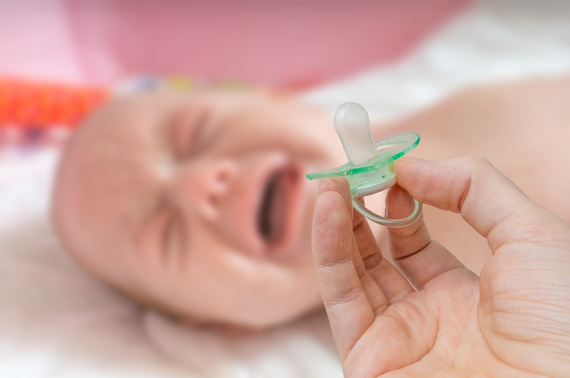In Part 1 of Healthy Mom, Healthy Baby, I introduced Jane, a pregnant woman suffering from debilitating depression and anxiety, whose story is similar to that of many women who visit me professionally. Although in pain and tortured by symptoms, Jane delayed asking for help due to fear of how she would be perceived as a mother. Her symptoms are overlaid by guilt at not being able to experience the joys of pregnancy or feel a connection to her future child.
Mom must be healthy for baby to be healthy, so I applaud every woman who takes the difficult step of asking for help.
Let's look back at Jane's story and pull apart some key issues that relate specifically to mental health and pregnancy in order to further explore the idea that mom and baby's health and welfare are inextricably bound together.
Jane has experienced significant anxiety throughout her pregnancy, along with frequent nausea and fatigue. She just hasn't felt good, which is common for women in her situation. When women don't feel physically well, they are more likely to take over-the-counter medications like acetaminophen, which have been associated with possible long term developmental risks for baby.
Jane was health conscious before her pregnancy, but as she advanced through her second trimester and became more depressed and anxious, her husband noticed she was not caring for herself as she normally would. She no longer exercised regularly, frequently forgot to take prenatal vitamins, and was not eating well. As a woman who formerly planned her week around her OBGYN visits, Jane instead missed two doctors appointments in a row. Poor self care is common for women suffering from antenatal mood disorders and poses risks for mom and baby.
Let's Talk About Mom First
On average women visit their OB 20 times during pregnancy, so missing an appointment here and there may not seem like a big deal. But, for women like Jane, with antenatal mood disorders, every appointment is important so as to keep tabs on potentially serious health risks. Depression causes cortisol levels to go up, which in turn increases inflammation throughout the body, leading to many issues for mom and baby.
Moms with serious untreated antenatal depression and/or anxiety face an increased risk for diabetes, pre-eclampsia and eclampsia, serious medical problems that at worst can lead to fetal demise (eek). Women with these medical issues are often urged by their OBGYN's to come in even more frequently, something that is hard to do when your inclination to go anywhere is hindered by depression, anxiety, low energy, and apathy.
The Importance of Bonding
Let's return to Jane. Despite wanting to be pregnant and hoping for a girl, Jane feels disconnected and disengaged from her pregnancy, is unable to enjoy the wonder and magic going on inside her body, and cannot bond with her baby because of her mood symptoms. Depression can impede a woman's ability to anticipate the positive, plan for the future, and become emotional and excited about the new life to come.
Every woman deserves the opportunity to appreciate her pregnancy, to fall in love with her baby and connect in the quiet moments alone. There is something uniquely magical about feeling your baby kicking and the deep bond that no one but you can and will ever have with your baby -- no mom should be robbed of that opportunity due to active symptoms of depression and anxiety.
Risks Don't End With Delivery: Postpartum Effects
What will happen to Jane after her baby is born? Most women expect that since they felt anywhere from pretty decent to completely fine before their delivery that they will return to that state afterwards, but unfortunately untreated mood symptoms in pregnancy seldom, if ever, resolve with delivery. Returning home with a new baby poses challenges even for the most well-adjusted parents; for women in the throes of untreated postpartum depression/anxiety, it can be overwhelming and impossibly difficult.
Women with significant postpartum depression/anxiety may have more difficulty successfully nursing and bonding with their new babies. In the most severe cases of postpartum depression, women can become suicidal and in the most heartbreaking cases, end their lives. This awful outcome is unfortunately one of the most common cause of death for women during the first year postpartum. Terrifying.
What About After Baby Is Born?
When women like Jane come to see me, they often ask more about the risks of treatment to their future child than about themselves. After discussing potential risks, we then cover at length the potential risks of failing to treat. If Jane remains untreated, as noted above, her baby may face an increased risk of several intra-uterine complications as well as long-term issues after birth. Baby's sleep and temperament may be negatively affected for years to come, along with the risk of delayed milestones, behavioral and attentional issues and adolescent depression.
Exposure to mom's nearly inevitable postpartum depression and/or anxiety further puts baby at risk for attachment problems, emotional issues, language delays and behavioral problems. If mom's suffering continues, her children have an increased chance of similarly experiencing psychological distress in childhood. However, if mom is treated, her children benefit and the likelihood of childhood psychiatric diagnosis is reduced.
Oh My! What's a Mom to Do?
GET HELP! Mom does not have to face the painful symptoms of depression and/or anxiety alone. There are many ways to improve and become well again. If mom is not well, her body cannot be in the optimal state for her future child; the sooner mom is treated, the better for her and for her baby. It is never too late for treatment.
If you or someone you love is suffering, please let them know help is available and can make what is otherwise a dark world light again.
Part 3 will review treatment options for mom in pregnancy and postpartum, so check back soon!

